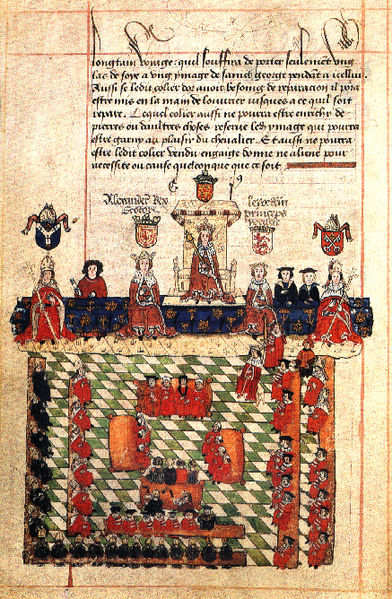
English parliament in front of the king Edward I ~ 1300
 English parliament in front of the king Edward I ~ 1300 |
One may trace the origin of Parliament to the times of the
Anglo-Saxons. Anglo-Saxon Kings were advised by a council known as the
Witenagemot, whose foremost members were the King's sons and brothers.
The entire Anglo-Saxon
body politic was reformed when William of
Normandy conquered England in 1066. He granted land to his most important
military supporters, who in turn granted land to their supporters, thus creating
a feudal hierarchy. Those who held lands directly from the King were known as
tenants-in-chief. William I was an absolute ruler, but, as a matter of course,
he sought the advice of a council of tenants-in-chief and ecclesiastics, before
making laws.
The royal council slowly developed into a Parliament. The first time the term
Parliament appears in official documents was during Henry III's reign. It still
was largely an informal affair and was not an official body.
In 1265, Simon de Montfort, 6th Earl of Leicester, who was in rebellion against
Henry III, summoned the first elected parliament without any prior royal
authorisation. The right to vote in Parliamentary elections for county
constituencies was uniform throughout the country, granting a vote to all those
who owned the freehold of land to an annual rent of 40 shillings. The
archbishops, bishops, abbots, earls and barons were summoned, as were two
knights from each shire and two
burgesses from each
borough. Knights had been summoned to previous
councils, but the representation of the boroughs was unprecedented. De
Montfort's scheme was formally adopted by Edward I in the so-called Model
Parliament of 1295. At first, each
estate
debated independently; by the reign of Edward III, however, Parliament had been
separated into two Houses: one, including the nobility and higher clergy, the
other, including the knights and burgesses. The authority of Parliament grew
under Edward III; it was established that no law could be made, nor any tax
levied without the consent of both Houses as well as of the Sovereign. This was
a development that came out of necessity for Edward III as he was involved in
the Hundred Years War and needed finances.
The growing influence of Parliament was restrained by numerous civil wars. By
the end of the Wars of the Roses, royal supremacy had been restored. The Crown
was at the height of its power during the reign of Henry VIII. Even though Parliaments
continued to behave submissively under the Tudor monarchs who followed Henry
their power in the business of running the state gradually kept increasing.
Nowadays monarchs have a merely symbolical role in Parliament.
![]() vocabulary:
vocabulary:
|
body politic |
állam(test) |
|
burgess |
polgár |
|
borough |
városi (választó)kerület |
|
estate |
(itt) egyrangúak csoportja |
credits:
The text was extracted from Wikipedia The Free Encyclopedia under GNU Free Documentation Licence.